#the typography is absolutely horrible and i feel like it both makes it better and worse
Note
Idk if you saw the thing about Caboose having a mullet, then I saw your long haired Simmons and I thought about Simmons with a mullet...then I thought about Grif with a mullet...then I thought about ALL OF RED TEAM with mullets!
This is not a request for a draw, simply a request to rotate this image in your mind
Oh my god, I know exactly the image you're talking about!
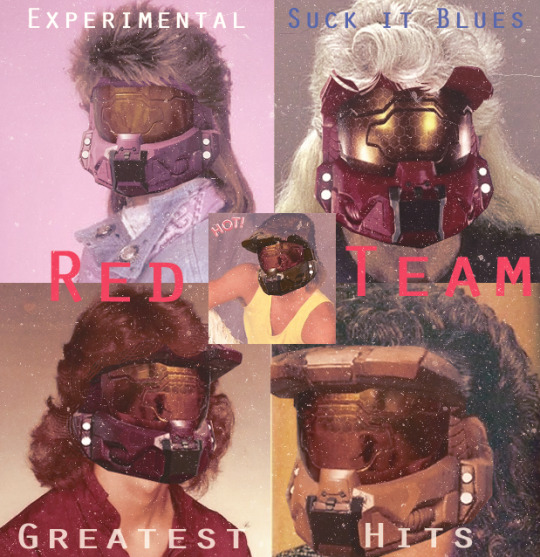
I even have it on vinyl, so iconic!
#vashplies#rvb#red vs blue#red team#Trust me when I say it#I'm pretty sure my mind gave it a whole-ass 420 blaze it degrees kind of rotation#it's like that damn otacon ask again#i spot the opportunity to shitpost and i take it#thank you for bringing this image to life and giving me the opportunity to perform my worst#ngl 343 should consider mullet helmet upgrades in their next MCC patch#mullet is actually one of my fave haircuts though#best i could do was paying it the era-appropriate homage#the typography is absolutely horrible and i feel like it both makes it better and worse#lopez is my fave this small hot truly makes it
116 notes
·
View notes
Text
Ranking Every Shitty Archer’s Goon Book Cover
That’s right kids, I’m back with another one. First off, Archer’s Goon is an extremely fantastic book, that you should absolutely read as soon as possible. Secondly, and most amusingly, it is the only other DWJ book to be adapted for screen apart from Howl’s Moving Castle. This was an extremely bonkers choice and the TV miniseries reflects that with how goddamn bonkers it is. Thirdly, there are thirteen covers of this book and apparently none of them were really designed to try to entice a human being to want to read the book.
I’m including the miniseries DVD covers here. for funsies. I’m also gonna translate them (badly. with google translate.) Extra points will be awarded for inclusion of Torquil (the best character in this book, or probably any book) or Awful (the second-best character), as they should.
also, partly to blame for this post is @anders-was-right who suggested I do it in the tags of the last DWJ ranking. If enough people want me to, I’ll find every Howl’s Moving Castle cover and rank them by Howl hotness.
1. 七人の魔法使い - Seven Wizards - It works. It’s sturdy.
Miho Satake wins once again! Look, I just feel like she really understands the spirit of DWJ books. Excellent backdrop, curving columns, strange buildings, moon... Points for the enormity of the goon. Points for how disgruntled Quentin looks.

2. Das Geheimnis des Siebten Zauberers - The Secret of the Seventh Wizard - My favourite title! Better than the original title.
This Quentin is all wrong, he’s far too serene- unless! this is Hathaway. It sorta looks like him, the period clothing and background suggest it’s him... Why would you put Hathaway on the cover? I don’t know but I love Hathaway so I’ll make excuses. Mystifying but somewhat enticing. I’d pick this book up.

3. Same title as above.
This one has a very ‘classic 80s kids Scifi book’ feel- I’m not mad at it. MAJOR points for this being the only cover to have a proper spaceship on it. Both too confusing and too mundane.

4. Ловушка для волшебников - Wizard Trap - Eh. It works.
I truly truly enjoy the magic floating pages and these Russian covers generally sit well with me but the vibe is far too cheerful. Awful looks almost cute, Quentin looks downright merry, Howard... actually, I like this Howard quite a bit. But the goon looks awful. I spy Torquil in the background there, and I wish I could see more of him.

Everything beyond this point is a sin and is getting sent to graphic design jail. You have been warned.
5. And now we come to our first DVD cover! This time it’s called ハワードと七人の魔法使い - Howard and the Seven Wizards - which happens to be slightly factually incorrect, if you think about it.
It appears to feature Torquil not once but TWICE, forgoing multiple other siblings to do so! I approve HEARTILY. The setup works (ish), Awful (if that is her) looks suitably angry, there is a spaceship, albeit a bad one. Also, the goon himself has been entirely forgone in favour of other characters, which I feel indifferent about.

6. Fuck, this one is so weird. It looks like a manual on how to stand up to your imposing father. I do not enjoy this. I do not understand it. Trapping just Howard and the goon in a doorway to what looks like the afterlife (?) was a truly strange choice. Also, weird typography.

7. Is this really the UK DVD cover?? It really, really looks like a documentary on abusive parenting or something. This is so totally, utterly wrong in every way that I actually sort of don’t know what to say about it. Where on earth is everyone? The only reason it’s scored so well is because I don’t find the image itself actively offensive to the senses.

8. הבריון של ארצ'ר - Archer’s Bully. This is the one with the most literal title translation by FAR. Eh.
I truly dislike this one, starting with the offensive orange and the rather unusual forced perspective thing going on. I’ve been staring at it for too long and it’s freaking me out, I need to move on.

9. Ew! I’ve seen this one around quite a bit. Ew! a really horrid looking goon. A too-neat Howard. Awful looks okay. This just has stale vibes. No child would ever willingly pick this book up.
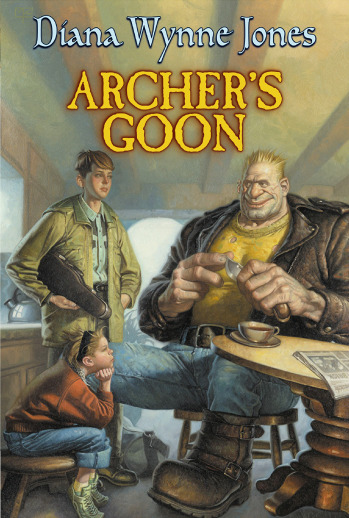
10. This is the most popular cover! OH NO! Why the goon, Dillian, and Torquil? What a weird choice. What are they doing, anyway?? What’s the weird little moat? WHY DOES THE GOON LOOK LIKE THAT?

Points for Torquil and points for his jewellery and makeup (many points) but minus points for how weird he looks.
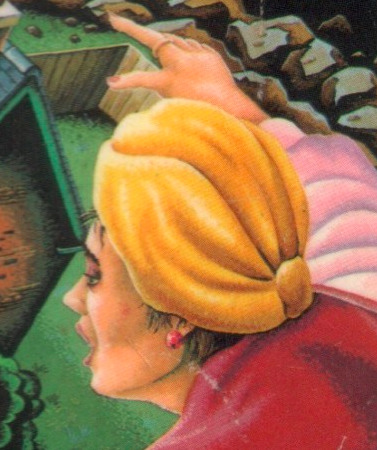
Bonus: also the Danish cover- De Syv Magter - The Seven Powers - A better title than the Seven Wizards. Maybe.
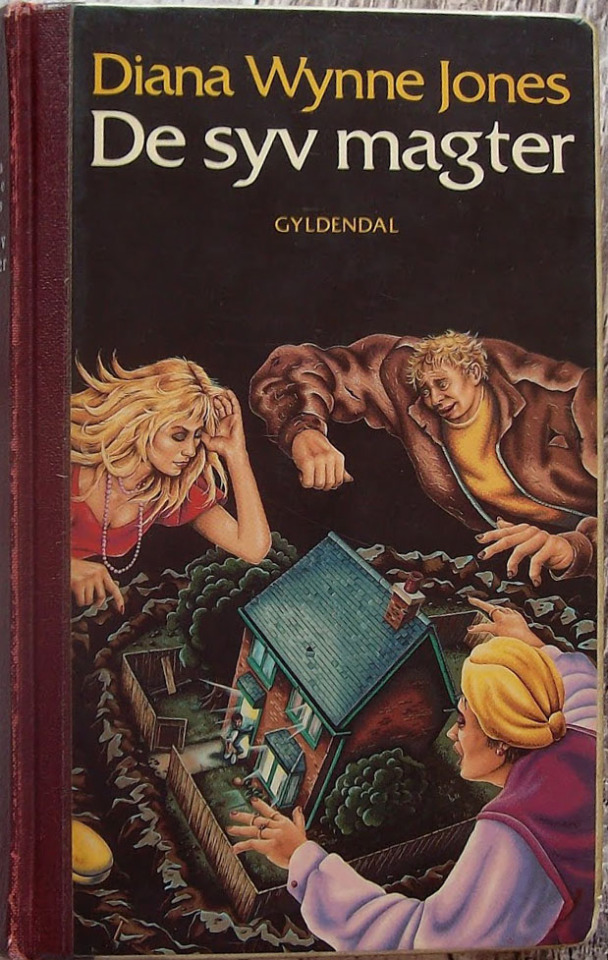
bonus bonus: Also the Swedish cover. same translation. WHY IS THIS THE POPULAR COVER.

bonus bonus bonus: also the cover of the Finnish edition, except this one- Kyylän Kyydissä- means ‘Riding Away’, or maybe ‘On the Ride’??, by far the weirdest title. I don’t know how it relates to the book. If you speak Finnish, please come explain this mystery to me.

11. Oh! My! God! really horrible, utterly unmagical, hideous composition, the goon is too mundane but also too creepy, like your weird neighbour who peers over the wall into your garden while you’re playing with your cat. That tagline is no good. I like nothing about this image.

12. ‘HE WAS BIG, HE WAS UGLY AND HE WAS IN THEIR KITCHEN’?????? that TYPEFACE, where did they even find that typeface! the sickly green background! Poor Fifi looking like that!
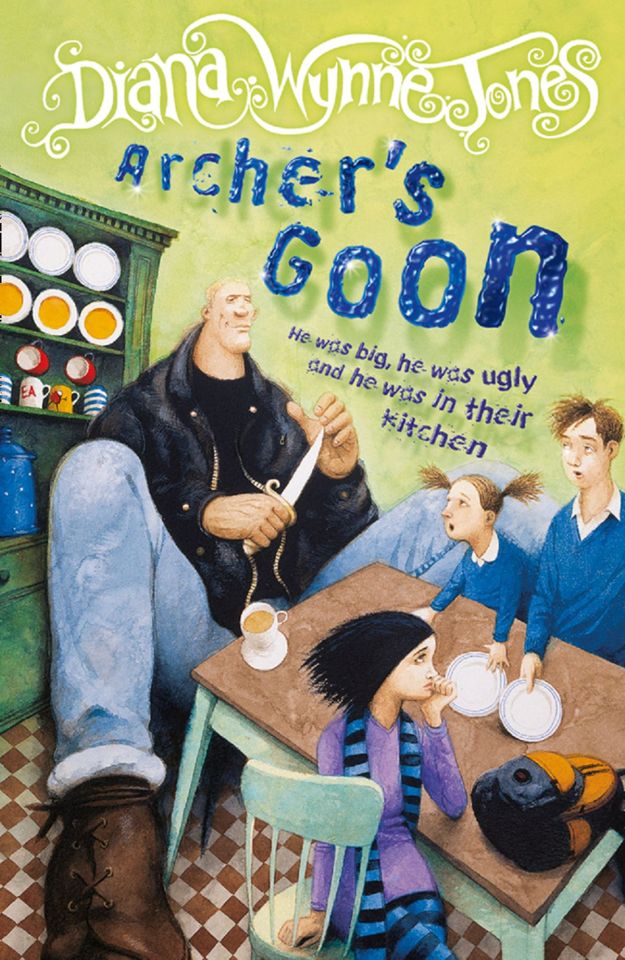
13. I own a second copy of this book. It has this cover. I keep it under my bed because I can’t look at it. It doesn’t even get points for Torquil, it looks like a poster for the world’s worst Night at the Museum ripoff. The type is the ugliest it could possibly be. The colours are the ugliest they could’ve chosen. And the worst crime? fuckin’ ‘AS SEEN ON TV’.
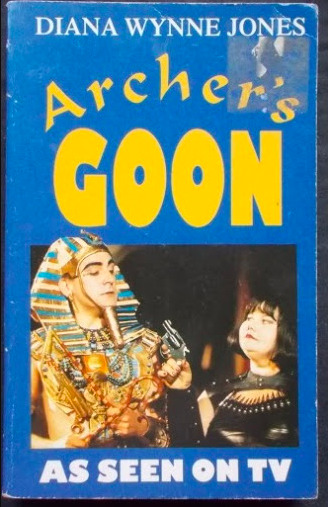
#I'm such a dramatic bitch#torquil#archer's goon#diana wynne jones#ranking#op#book covers#cover design#art#bad#long post#miho satake#books#publishing#author#fantasy#DWJ
4 notes
·
View notes
Text
Podcast: Is Creativity Enhanced By Mental Illness?
Are people with mental illness more creative? Jackie believes there may be a link between the two, while Gabe thinks it’s just a bunch of hoopla. Get ready — they’ve both done their research and are ready to back their claims. Tune in to hear a lively (and friendly) debate on whether the science is valid, the difference between inspiration and creativity, as well as their own opinions and experiences on mental illness and creativity.
What’s your take? Join us on this Not Crazy podcast to see whose side you’re on, or if you’re somewhere in the middle.
(Transcript Available Below)
SUBSCRIBE & REVIEW
About The Not Crazy Podcast Hosts
Gabe Howard is an award-winning writer and speaker who lives with bipolar disorder. He is the author of the popular book, Mental Illness is an Asshole and other Observations, available from Amazon; signed copies are also available directly from Gabe Howard. To learn more, please visit his website, gabehoward.com.
Jackie Zimmerman has been in the patient advocacy game for over a decade and has established herself as an authority on chronic illness, patient-centric healthcare, and patient community building. She lives with multiple sclerosis, ulcerative colitis, and depression.
You can find her online at JackieZimmerman.co, Twitter, Facebook, and LinkedIn.
Computer Generated Transcript for “Mental Illness-Creativity” Episode
Editor’s Note: Please be mindful that this transcript has been computer generated and therefore may contain inaccuracies and grammar errors. Thank you.
Announcer: You’re listening to Not Crazy, a Psych Central podcast. And here are your hosts, Jackie Zimmerman and Gabe Howard.
Gabe: Hey, everyone, welcome to the Not Crazy podcast. Jackie, how are you?
Jackie: Oh, I’m doing awesome. How are you, Gabe?
Gabe: I am fantastic. Today we are going to. I don’t know if we want to use debate, argue, discuss creativity and genius when it comes to mental illness.
Jackie: This is a topic that I candidly have not thought a ton about. But when I started researching it, I found some really interesting stuff and I don’t know if it actually supports the concept that creativity and mental illness go hand-in-hand or if it just sort of says like. Not really, but congrats on being creative.
Gabe: I live in the bipolar space, so I have I have severe and persistent mental illness. And, you know, I’m not playing the suffering Olympics with you, but you just have depression. You know, like I’m considered mental illness. You’re considered mental health. I don’t know who comes up with these categories, but in the severe and persistent mental illness space, this idea that, hey, yeah, you’re really, really sick you have a 15 percent suicide rate. You’ve sat in the corner and prayed for your death. But, hey, you’re probably a creative genius. Really gets discussed a lot.
Jackie: It does, and in what I read, to your point of like, I’m kind of like just depressed and anxious and you’re super bipolar. What I’ve read is that in terms of the conversation of creativity and mental illness, slash mental health, people who are living with bipolar seem to be on the top of this conversation. You are the top of the list where if we’re looking for a correlation between mental illness and creativity, it appears that those who are living with bipolar really win because they’re the super creative ones.
Gabe: This is where I wish our show was kind of like a morning zoo show and we had sound effects so that I could just slam a button that was like AAAYNNGHH. The best thing I can say is it’s just bullshit. It’s bullshit in every imaginable way. But I can never convince people of this. And one of the reasons that I can’t convince people of this is full disclosure. There’s a ton of studies that say that I’m wrong. There just are. There are a ton of studies that say that I’m wrong. People are like, Gabe, you love science. So why won’t you admit that you’re wrong?
Jackie: I don’t know that you’re wrong because, I didn’t read the studies, I read the abstract of the studies. Let’s be real here. Who’s got time to read studies? But the studies that I’m reading, aka abstracts that I’m reading are saying not so much that having a mental illness makes you more creative. I don’t think that that’s what they’re saying. And I don’t necessarily agree with that either. What the studies are saying is that the people who live with bipolar and schizophrenia and depression and anxiety seem to be drawn to creative careers more frequently. So there’s this one from 2013. It was published by the Journal of Psychiatric Research. And it said that people who make their living either through scientific or creative occupations were more likely to have bipolar or a relative with the condition. When I see that, I don’t see them going, hey, oh, you’re bipolar. Check once you get that diagnosis, now you’re super fucking creative. No, they’re just saying, like you probably have a draw to writing or art or something of the like. And more people living with mental illness tend to go that route.
Gabe: One, I have no idea. But here is why I have no idea this is all based on self-reporting. So it is really just obnoxious. It is absolutely, unequivocally obnoxious to think that defense attorneys can’t have bipolar disorder.
Jackie: No, I don’t think that’s what these are saying though, they’re not saying people who live with mental illness cannot do anything other than be wildly creative.
Gabe: I agree that they’re not saying that, but what they are saying is that people with bipolar disorder are drawn to creative fields. But the way that they know that is they interviewed all the people in creative fields and they said, Hey, do you have bipolar disorder? And in the creative fields, in the liberal fields, people felt more empowered to say yes. Then they went over to things like doctor, lawyer, or fighter jet pilot. And they asked all of them if they had bipolar disorder. And all of them said no because they can’t self-disclose. These are more conservative fields where people will not tolerate their mental illness. They could lose their jobs, their careers, their income, their money, their health insurance. So, frankly, they all lied. They just all straight up lied.
Jackie: Ok, well, what about this, another study and I don’t know the year of it because I didn’t write it down, so feel free to Google this shit. Was it a screened 700,000 Swedish teenagers for intelligence and they found it that those who were exceptionally creative were also four times more likely to have bipolar. And so my question for you with this study is this isn’t self-reported necessarily. And they were screening for intelligence, which to me I’m going to assume probably incorrectly that it’s some kind of like assessment test, especially if they’re teenagers. Right? Maybe like math, science. The whole jazz doesn’t say
Gabe: Math, science, history
Jackie: What kind of test it was.
Gabe: Started the big bang.
Jackie: I have no idea what that was.
Gabe: Aww, anyway, continue.
Jackie: Did you just show your age?
Gabe: No, that show just went off the air, literally.
Jackie: Well, what’s it?
Gabe: It was The Big Bang Theory.
Jackie: Oh, that show sucks, anyway.
Gabe: That
Jackie: So.
Gabe: That is horrible, but I’d like to point out that was also not an accurate representation of physicists. But people think that it is just like they think that a lot of these studies are accurate representations of what it’s like to live with bipolar disorder. I’m not trying to shit on your study. I’m really not. And I’m not trying to I’m not trying to shit on people who are creative, but to give the credit to your creativity to something awful. Why? Bipolar disorder is just shitty. Mental illness is just shitty. There’s not like this back end thing. You’re creative because you’re creative. You’re awesome because you’re awesome. Could you imagine if somebody said this: people with cancer are much more likely to be excellent engineers. What? What? Why? That doesn’t make any sense. That is nonsense. People with cancer are much more likely to have cancer.
Jackie: Well, I can see how if you’re attributing the creativity to the mental illness, that sucks, right? That doesn’t feel good. However, I don’t think that anybody is saying their creativity is exclusively because of their mental illness. Maybe it’s increased. Maybe it’s more vivid or more vibrant or, you know, you can tap into it better. I have a fine arts degree. I am not creative at all, like at all.
Gabe: You’re literally a graphic artist, right
Jackie: I am, but
Gabe: I mean, that, that’s awesome. That’s you’re an uncreative graphic artist.
Jackie: Well, what I’ve always said is I I’m really good at practical design, layouts, typography. I’m really good at seeing something for needing it to make sense and to relay information. In my classes, they were like, make whatever you want. Make it super fun. I really struggled. I would not a creative person. I struggle to tap into my creativity. If there was a way to turn that button on, I would gladly do it.
Gabe: What you were talking about was inspiration, not creativity. Yeah, I think creativity exists in a completely separate part of the brain now going through bipolar disorder, going through schizophrenia, going through major depression or I don’t know, going through any tragedy, just a trauma or an earthquake or the death of a loved one, that can inspire you. There are people who have written incredible books based on something very traumatic that happened to them and that did inspire the book. But their creativity existed beforehand and then they got inspiration from the negative event. So do people with bipolar disorder have a greater source of information? Can they write about things that are more interesting to the general public? I agree completely. But did bipolar disorder create their creativity? No, they were just creative. If they did not have bipolar disorder or any other mental illness, they would be just as creative. They just wouldn’t have that thing to inspire them.
Jackie: I don’t know if I agree with your assumption that people who are creative just have it and then they get inspired to use it. I’m inspired all the time. I don’t have the follow-through in terms of the creativity. And I’m a writer. I write things. People pay me to write things. I don’t think that that’s creativity. I think they go write about this. So I don’t know that I necessarily agree that like everybody or even just creatives in general are just waiting for that thing to turn them on to write about. But I don’t know. Again, I don’t live with these conditions. But my assumption, again, based on science, based on what we know, the amount of ideas that flood your mind or maybe like having delusions like those things could cause creativity. Right.
Gabe: I think they could inspire you to write about the things that you experienced when you were delusional. Your base premise and creativity, I think that’s yours. And one of the things that you said that was very interesting there is that you are a writer and you are creative, but you don’t sit down to write. You haven’t gotten it done. That has nothing to do with inspiration or creativity. That has to do with organization and time management. And I think in general, people with severe and persistent mental illness are very disorganized. And you’ve described before your anxiety, your anxiety is so high that rather than write something or create something or do the dishes, you’re in a corner trying to eliminate your anxiety. So I do understand that we’re kind of in a semantic argument. But here’s the problem that I have, Jackie, like, very sincerely. I just don’t like it when people are good at something. In fact, people are great at something. People are amazing and awesome and they just don’t take the credit for it.
Jackie: Are they not taking the credit? Or is it the people having these conversations are not allowing them to take the credit?
Gabe: I don’t really care who’s doing it. If you are an amazing writer. That’s because you are an amazing writer. It’s not because bipolar, schizophrenia, major depression, anxiety helped you become an amazing writer. I just think that’s bullshit. These illnesses are literally trying to kill us. I just have a problem with something that is trying to kill me and cost me marriages and friendships and connections, also shows up at the awards ceremony because I did something creative. It’s a bit like having a parent who beats you that then takes credit for your college degree. It’s like you beat him. You’re an abusive parent. Go away. He got a college degree in spite of you, not because of you.
Jackie: I agree with you if they’re saying the only reason why you’re good at art is because you’re bipolar, that sucks. It took all these things away from you. You’ve had to fight all the stuff, blah, blah, blah. But everything you just said. But what if you’re also a phenomenal painter and you say the silver lining to being bipolar and having all this shitty stuff is that it’s enabled me to be an amazing painter.
Gabe: First off, how people choose to live their own lives and manage their own experiences. That really is up to them. I do believe very strongly that people have their own right to tell their own story in the way that makes the most sense to them. That said, I think they’re wrong. I think they’re wrong on it, like in an opinion level, in the same way that I think that you’re wrong for liking pineapple on pizza.
Jackie: I do not like pineapple on pizza. For the record.
Gabe: But if you did, I would not tell you that you were wrong. Because
Jackie: Oh, you are wrong. I’m sorry. You’re wrong. If you like pineapple on pizza, you’re wrong.
Gabe: You understand what I’m saying, right? Like, I’m not trying to make it illegal to put pineapple on pizza. Unlike my co-host, Jackie apparently has very strong feelings about pineapple on pizza, which I do share. I’m just trying to make a point. But I think about like things that have inspired me. One of the best episodes of a podcast I ever did had to do with my father in law’s death and grief and how this rippled through me and my family. It was a powerful episode. It was a popular episode. I still to this day get a lot of pats on the back for being willing to so openly talk about death. This does not make death good. It just doesn’t. A bad thing inspired me. It is true. But I’m not going to give my father in law’s death credits for all of that success that came from me and how I chose to process it. It doesn’t retroactively make that death a good thing. We should all not go around killing our loved ones so that we can be inspired to do the grief podcast or write the grief blog or give the grief eulogy. I just I think this may be something positive that comes out of a negative. But make no mistake, you made the positive.
Jackie: Ok. But I’m not even so sure this is an argument of semantics anymore. I think this is an argument of perspective and I’m going to use a controversial example, which is religion. Oh, here we go. The reasoning is, so when you’re very, very sick, if you are somebody who believes in God or a higher being or whatever it’s called, I am not that person, obviously, because I don’t know what it’s called. But let’s say you’re a believer in God and you say it’s OK. Right? This is all in God’s hands. I’m gonna pray, he’s going to handle it. I’m gonna be all right. This is his plan. And I am going to live my life how he wants me to, because that’s how this goes. And you’re me who does not have that same faith and looks at the situation you’re in. We’re obviously talking about something bad happening. And I almost wish I had that faith, because then I would have the reassurance. It’s gonna get better. I would have the reassurance that somebody is looking out for me. I have often said I thought it would be easier to be a person of faith when I was really sick because then I could kind of like wash my hands of it and be like, it’s cool. Somebody else is driving this train. To me, that’s perspective.
Gabe: We’ll be back in a minute after these messages.
Jackie: And we’re back talking about creativity in mental illness.
Gabe: I am often offered supplements and coaching programs and CBD oil all to treat my bipolar disorder. Now I know many people who have well, frankly, fallen for this scam. They have ignored their psychiatrist advice. They no longer go to therapy. They are no longer taking any formal or researched or scientifically proven medications. And instead they treat their bipolar disorder 100 percent through this coaching program or website or whatever. And they are so happy. They are just so happy. I mean, they’re like, oh, my God, I got off the medicine. I’m doing an all natural cleanse. And for a while they’re living great. But I worry so desperately about them because. Yeah, for a while they’re doing great. I’m not denying that they’re not doing great. They may do great for three months, six months, a year, a year and a half. But in the case of bipolar disorder, it’s cyclical. It’s cyclical. Sometimes you will be manic. Sometimes you will be depressed. Sometimes you will be somewhere else on the spectrum. And maybe for that year, they’re right in the middle and everything’s fine. But because they’re not controlling the symptoms, they will hit up mania or fall down to depression. It’s just a matter of time. It’s just a waiting game. But for that year, their perspective and their reality is that they’re doing fantastic and they’re doing better than everybody else that’s relying on big pharma or these unnatural poisons you put in your body. I understand that they’re happy now, but I want them to be happy forever. I want to be happy forever. So I don’t know. You’re right. It is controversial. I don’t want to fall down a rabbit hole of defending or bashing religion. But just because something gives you comfort doesn’t mean that it’s right.
Jackie: No, but again, like I think your example of taking medication is a little bit different here, because I think anybody who is sick in any way, shape or form all of us. I think it’s human nature to want to find meaning in it, you know. And I think that the meaning could be because of your religion. It could be because of your art. It could be because of the career you have. You want to correlate a meaning to it because otherwise it’s just shit for the sake of shit. Otherwise, everything just sucks for no reason. And most of us cannot handle that mentally, we can’t process that, of why this shit is happening for no other reason. And maybe people do say I am super creative and it’s because of my bipolar disorder. I can’t tell that person that they’re wrong if they’re seeing the meaning in that, and that’s how they get through their day and their life and they continue to be happy and healthy and productive people. How can you tell them their wrong?
Gabe: I think that truth matters. And I think that facts matter.
Jackie: It is their truth and the facts support it.
Gabe: I disagree with the findings because of the self-reporting nature, which I understand is such a slippery slope, because there’s people out there that say, Gabe, how do you know you have bipolar disorder? Because there is no definitive test. It’s all self-reporting. And so I hear what you’re saying. And you’re right. You’re right. I know people who are just incredibly happy and they firmly believe that the earth is flat. But I just I feel so bad for them. I do. The earth is not flat. It is not flat. It’s not flat. It’s not flat. It’s not flat.
Jackie: But we know that because of the facts that support that.
Gabe: But I think these facts are suspect. You’re right. I can’t say that they’re wrong, but I do think that they’re suspect. My fear is, is that somebody who’s newly diagnosed with bipolar disorder or depression or just any sort of serious mental illness will think that they need to find a creative endeavor, because that’s where they’re most likely to excel statistically. But I know all kinds of people with bipolar disorder, schizophrenia and major depression who are engineers and lawyers and doctors and they don’t have a creative bone in their body. And I also worry about pigeonholing. And what I mean by that is I do not consider myself to be creative at all. I have not a creative bone in my body. Jackie, you can back this up. I tried to design a logo for something and you were like these colors. Remember what you said to me?
Jackie: No.
Gabe: I just, it was very harsh, but it was ugly. What I created was ugly. And I say to people, look, I have bipolar disorder and I’m not creative at all. And they say, yes, you are. You have a podcast. Well, well, OK. Yes, you are. You’re funny. OK, well, but isn’t everybody funny sometimes?
Jackie: No.
Gabe: Isn’t everybody creative in some way?
Jackie: No.
Gabe: I mean, I think we’re just always looking for that link. So no matter what, we find a way to make somebody with mental illness into a person who is also creative.
Jackie: I disagree because in the research and also in the world generally, the term creative is somebody who is a writer. They are a painter. They are a fine artist. They do some kind of categorically artistic thing. It’s not so much like how do you approach your day? Is it creatively? We’re talking literally about the fine arts. And that’s as a career choice. I still maintain that the data just says people with mental illness tend to lean more towards that way. At no point does it say if you’re bipolar, you should be creative, and if you’re not, you’re doing it wrong. And I don’t think that it implies that everybody should be creative, whether you have a mental illness or not. It’s simply stating a lot of people tend to go that route. It’s not saying you can’t do anything else or you won’t be good at anything else.
Gabe: That’s the message that I just want to make sure gets out there. I know what the data says and I do appreciate data. There’s just a part of me that just worries so much. And this is my question to you, Jackie. Now, honestly, how do you feel about somebody who gives the credit for their creativity or their intelligence or their genius to an illness that is trying to kill them and that has caused them suffering? How do you feel about somebody giving a positive quality to such a negative thing?
Jackie: I would say that scientifically we know that the placebo effect is real. And if that person in this instance is using something like their illness as their placebo, as the catalyst as the result, it’s real for them. And if they feel more creative because of their mental illness, then that’s why they are more creative. It’s all how what you believe in the human mind is annoyingly powerful. And again, in this situation, if the placebo is their illness. Right? And they are like, I’m so creative. Before I was diagnosed, I was not creative at all. And now I’m a genius painter, then that’s true for them.
Gabe: Jackie, I completely agree that perception becomes reality. And if your reality is positive and good, then who the hell am I to mess with it? I do sincerely believe that. I just want everybody living with a mental health issue, serious and persistent mental illness to live their best life. And however you arrange that in your mind. I couldn’t be more behind.
Jackie: Yeah, I think that we can both get on the same page for that one.
Gabe: Amen. Listen up, everybody, creatives, non creatives, agree with Jackie, agree with Gabe. No matter what, we all need to be on the same page when it comes to subscribing to our podcast. Please leave us as many stars as you feel comfortable with and use your words and write us a review. Share us on social media. Email us to a friend. Tell everybody about us. And here’s a little trick. If you email [email protected], we will send you Not Crazy stickers if you PayPal us a dollar. It’s the best deal going. That’s Not Crazy stickers for a dollar at [email protected]. Email us for instructions. Please stay tuned after the credits for an outtake because it turns out Gabe and Jackie have more to say.
Jackie: We will see you next Monday.
Podcast: Is Creativity Enhanced By Mental Illness? syndicated from
0 notes
Text
Podcast: Is Creativity Enhanced By Mental Illness?
Are people with mental illness more creative? Jackie believes there may be a link between the two, while Gabe thinks it’s just a bunch of hoopla. Get ready — they’ve both done their research and are ready to back their claims. Tune in to hear a lively (and friendly) debate on whether the science is valid, the difference between inspiration and creativity, as well as their own opinions and experiences on mental illness and creativity.
What’s your take? Join us on this Not Crazy podcast to see whose side you’re on, or if you’re somewhere in the middle.
(Transcript Available Below)
SUBSCRIBE & REVIEW
About The Not Crazy Podcast Hosts
Gabe Howard is an award-winning writer and speaker who lives with bipolar disorder. He is the author of the popular book, Mental Illness is an Asshole and other Observations, available from Amazon; signed copies are also available directly from Gabe Howard. To learn more, please visit his website, gabehoward.com.
Jackie Zimmerman has been in the patient advocacy game for over a decade and has established herself as an authority on chronic illness, patient-centric healthcare, and patient community building. She lives with multiple sclerosis, ulcerative colitis, and depression.
You can find her online at JackieZimmerman.co, Twitter, Facebook, and LinkedIn.
Computer Generated Transcript for “Mental Illness-Creativity” Episode
Editor’s Note: Please be mindful that this transcript has been computer generated and therefore may contain inaccuracies and grammar errors. Thank you.
Announcer: You’re listening to Not Crazy, a Psych Central podcast. And here are your hosts, Jackie Zimmerman and Gabe Howard.
Gabe: Hey, everyone, welcome to the Not Crazy podcast. Jackie, how are you?
Jackie: Oh, I’m doing awesome. How are you, Gabe?
Gabe: I am fantastic. Today we are going to. I don’t know if we want to use debate, argue, discuss creativity and genius when it comes to mental illness.
Jackie: This is a topic that I candidly have not thought a ton about. But when I started researching it, I found some really interesting stuff and I don’t know if it actually supports the concept that creativity and mental illness go hand-in-hand or if it just sort of says like. Not really, but congrats on being creative.
Gabe: I live in the bipolar space, so I have I have severe and persistent mental illness. And, you know, I’m not playing the suffering Olympics with you, but you just have depression. You know, like I’m considered mental illness. You’re considered mental health. I don’t know who comes up with these categories, but in the severe and persistent mental illness space, this idea that, hey, yeah, you’re really, really sick you have a 15 percent suicide rate. You’ve sat in the corner and prayed for your death. But, hey, you’re probably a creative genius. Really gets discussed a lot.
Jackie: It does, and in what I read, to your point of like, I’m kind of like just depressed and anxious and you’re super bipolar. What I’ve read is that in terms of the conversation of creativity and mental illness, slash mental health, people who are living with bipolar seem to be on the top of this conversation. You are the top of the list where if we’re looking for a correlation between mental illness and creativity, it appears that those who are living with bipolar really win because they’re the super creative ones.
Gabe: This is where I wish our show was kind of like a morning zoo show and we had sound effects so that I could just slam a button that was like AAAYNNGHH. The best thing I can say is it’s just bullshit. It’s bullshit in every imaginable way. But I can never convince people of this. And one of the reasons that I can’t convince people of this is full disclosure. There’s a ton of studies that say that I’m wrong. There just are. There are a ton of studies that say that I’m wrong. People are like, Gabe, you love science. So why won’t you admit that you’re wrong?
Jackie: I don’t know that you’re wrong because, I didn’t read the studies, I read the abstract of the studies. Let’s be real here. Who’s got time to read studies? But the studies that I’m reading, aka abstracts that I’m reading are saying not so much that having a mental illness makes you more creative. I don’t think that that’s what they’re saying. And I don’t necessarily agree with that either. What the studies are saying is that the people who live with bipolar and schizophrenia and depression and anxiety seem to be drawn to creative careers more frequently. So there’s this one from 2013. It was published by the Journal of Psychiatric Research. And it said that people who make their living either through scientific or creative occupations were more likely to have bipolar or a relative with the condition. When I see that, I don’t see them going, hey, oh, you’re bipolar. Check once you get that diagnosis, now you’re super fucking creative. No, they’re just saying, like you probably have a draw to writing or art or something of the like. And more people living with mental illness tend to go that route.
Gabe: One, I have no idea. But here is why I have no idea this is all based on self-reporting. So it is really just obnoxious. It is absolutely, unequivocally obnoxious to think that defense attorneys can’t have bipolar disorder.
Jackie: No, I don’t think that’s what these are saying though, they’re not saying people who live with mental illness cannot do anything other than be wildly creative.
Gabe: I agree that they’re not saying that, but what they are saying is that people with bipolar disorder are drawn to creative fields. But the way that they know that is they interviewed all the people in creative fields and they said, Hey, do you have bipolar disorder? And in the creative fields, in the liberal fields, people felt more empowered to say yes. Then they went over to things like doctor, lawyer, or fighter jet pilot. And they asked all of them if they had bipolar disorder. And all of them said no because they can’t self-disclose. These are more conservative fields where people will not tolerate their mental illness. They could lose their jobs, their careers, their income, their money, their health insurance. So, frankly, they all lied. They just all straight up lied.
Jackie: Ok, well, what about this, another study and I don’t know the year of it because I didn’t write it down, so feel free to Google this shit. Was it a screened 700,000 Swedish teenagers for intelligence and they found it that those who were exceptionally creative were also four times more likely to have bipolar. And so my question for you with this study is this isn’t self-reported necessarily. And they were screening for intelligence, which to me I’m going to assume probably incorrectly that it’s some kind of like assessment test, especially if they’re teenagers. Right? Maybe like math, science. The whole jazz doesn’t say
Gabe: Math, science, history
Jackie: What kind of test it was.
Gabe: Started the big bang.
Jackie: I have no idea what that was.
Gabe: Aww, anyway, continue.
Jackie: Did you just show your age?
Gabe: No, that show just went off the air, literally.
Jackie: Well, what’s it?
Gabe: It was The Big Bang Theory.
Jackie: Oh, that show sucks, anyway.
Gabe: That
Jackie: So.
Gabe: That is horrible, but I’d like to point out that was also not an accurate representation of physicists. But people think that it is just like they think that a lot of these studies are accurate representations of what it’s like to live with bipolar disorder. I’m not trying to shit on your study. I’m really not. And I’m not trying to I’m not trying to shit on people who are creative, but to give the credit to your creativity to something awful. Why? Bipolar disorder is just shitty. Mental illness is just shitty. There’s not like this back end thing. You’re creative because you’re creative. You’re awesome because you’re awesome. Could you imagine if somebody said this: people with cancer are much more likely to be excellent engineers. What? What? Why? That doesn’t make any sense. That is nonsense. People with cancer are much more likely to have cancer.
Jackie: Well, I can see how if you’re attributing the creativity to the mental illness, that sucks, right? That doesn’t feel good. However, I don’t think that anybody is saying their creativity is exclusively because of their mental illness. Maybe it’s increased. Maybe it’s more vivid or more vibrant or, you know, you can tap into it better. I have a fine arts degree. I am not creative at all, like at all.
Gabe: You’re literally a graphic artist, right
Jackie: I am, but
Gabe: I mean, that, that’s awesome. That’s you’re an uncreative graphic artist.
Jackie: Well, what I’ve always said is I I’m really good at practical design, layouts, typography. I’m really good at seeing something for needing it to make sense and to relay information. In my classes, they were like, make whatever you want. Make it super fun. I really struggled. I would not a creative person. I struggle to tap into my creativity. If there was a way to turn that button on, I would gladly do it.
Gabe: What you were talking about was inspiration, not creativity. Yeah, I think creativity exists in a completely separate part of the brain now going through bipolar disorder, going through schizophrenia, going through major depression or I don’t know, going through any tragedy, just a trauma or an earthquake or the death of a loved one, that can inspire you. There are people who have written incredible books based on something very traumatic that happened to them and that did inspire the book. But their creativity existed beforehand and then they got inspiration from the negative event. So do people with bipolar disorder have a greater source of information? Can they write about things that are more interesting to the general public? I agree completely. But did bipolar disorder create their creativity? No, they were just creative. If they did not have bipolar disorder or any other mental illness, they would be just as creative. They just wouldn’t have that thing to inspire them.
Jackie: I don’t know if I agree with your assumption that people who are creative just have it and then they get inspired to use it. I’m inspired all the time. I don’t have the follow-through in terms of the creativity. And I’m a writer. I write things. People pay me to write things. I don’t think that that’s creativity. I think they go write about this. So I don’t know that I necessarily agree that like everybody or even just creatives in general are just waiting for that thing to turn them on to write about. But I don’t know. Again, I don’t live with these conditions. But my assumption, again, based on science, based on what we know, the amount of ideas that flood your mind or maybe like having delusions like those things could cause creativity. Right.
Gabe: I think they could inspire you to write about the things that you experienced when you were delusional. Your base premise and creativity, I think that’s yours. And one of the things that you said that was very interesting there is that you are a writer and you are creative, but you don’t sit down to write. You haven’t gotten it done. That has nothing to do with inspiration or creativity. That has to do with organization and time management. And I think in general, people with severe and persistent mental illness are very disorganized. And you’ve described before your anxiety, your anxiety is so high that rather than write something or create something or do the dishes, you’re in a corner trying to eliminate your anxiety. So I do understand that we’re kind of in a semantic argument. But here’s the problem that I have, Jackie, like, very sincerely. I just don’t like it when people are good at something. In fact, people are great at something. People are amazing and awesome and they just don’t take the credit for it.
Jackie: Are they not taking the credit? Or is it the people having these conversations are not allowing them to take the credit?
Gabe: I don’t really care who’s doing it. If you are an amazing writer. That’s because you are an amazing writer. It’s not because bipolar, schizophrenia, major depression, anxiety helped you become an amazing writer. I just think that’s bullshit. These illnesses are literally trying to kill us. I just have a problem with something that is trying to kill me and cost me marriages and friendships and connections, also shows up at the awards ceremony because I did something creative. It’s a bit like having a parent who beats you that then takes credit for your college degree. It’s like you beat him. You’re an abusive parent. Go away. He got a college degree in spite of you, not because of you.
Jackie: I agree with you if they’re saying the only reason why you’re good at art is because you’re bipolar, that sucks. It took all these things away from you. You’ve had to fight all the stuff, blah, blah, blah. But everything you just said. But what if you’re also a phenomenal painter and you say the silver lining to being bipolar and having all this shitty stuff is that it’s enabled me to be an amazing painter.
Gabe: First off, how people choose to live their own lives and manage their own experiences. That really is up to them. I do believe very strongly that people have their own right to tell their own story in the way that makes the most sense to them. That said, I think they’re wrong. I think they’re wrong on it, like in an opinion level, in the same way that I think that you’re wrong for liking pineapple on pizza.
Jackie: I do not like pineapple on pizza. For the record.
Gabe: But if you did, I would not tell you that you were wrong. Because
Jackie: Oh, you are wrong. I’m sorry. You’re wrong. If you like pineapple on pizza, you’re wrong.
Gabe: You understand what I’m saying, right? Like, I’m not trying to make it illegal to put pineapple on pizza. Unlike my co-host, Jackie apparently has very strong feelings about pineapple on pizza, which I do share. I’m just trying to make a point. But I think about like things that have inspired me. One of the best episodes of a podcast I ever did had to do with my father in law’s death and grief and how this rippled through me and my family. It was a powerful episode. It was a popular episode. I still to this day get a lot of pats on the back for being willing to so openly talk about death. This does not make death good. It just doesn’t. A bad thing inspired me. It is true. But I’m not going to give my father in law’s death credits for all of that success that came from me and how I chose to process it. It doesn’t retroactively make that death a good thing. We should all not go around killing our loved ones so that we can be inspired to do the grief podcast or write the grief blog or give the grief eulogy. I just I think this may be something positive that comes out of a negative. But make no mistake, you made the positive.
Jackie: Ok. But I’m not even so sure this is an argument of semantics anymore. I think this is an argument of perspective and I’m going to use a controversial example, which is religion. Oh, here we go. The reasoning is, so when you’re very, very sick, if you are somebody who believes in God or a higher being or whatever it’s called, I am not that person, obviously, because I don’t know what it’s called. But let’s say you’re a believer in God and you say it’s OK. Right? This is all in God’s hands. I’m gonna pray, he’s going to handle it. I’m gonna be all right. This is his plan. And I am going to live my life how he wants me to, because that’s how this goes. And you’re me who does not have that same faith and looks at the situation you’re in. We’re obviously talking about something bad happening. And I almost wish I had that faith, because then I would have the reassurance. It’s gonna get better. I would have the reassurance that somebody is looking out for me. I have often said I thought it would be easier to be a person of faith when I was really sick because then I could kind of like wash my hands of it and be like, it’s cool. Somebody else is driving this train. To me, that’s perspective.
Gabe: We’ll be back in a minute after these messages.
Jackie: And we’re back talking about creativity in mental illness.
Gabe: I am often offered supplements and coaching programs and CBD oil all to treat my bipolar disorder. Now I know many people who have well, frankly, fallen for this scam. They have ignored their psychiatrist advice. They no longer go to therapy. They are no longer taking any formal or researched or scientifically proven medications. And instead they treat their bipolar disorder 100 percent through this coaching program or website or whatever. And they are so happy. They are just so happy. I mean, they’re like, oh, my God, I got off the medicine. I’m doing an all natural cleanse. And for a while they’re living great. But I worry so desperately about them because. Yeah, for a while they’re doing great. I’m not denying that they’re not doing great. They may do great for three months, six months, a year, a year and a half. But in the case of bipolar disorder, it’s cyclical. It’s cyclical. Sometimes you will be manic. Sometimes you will be depressed. Sometimes you will be somewhere else on the spectrum. And maybe for that year, they’re right in the middle and everything’s fine. But because they’re not controlling the symptoms, they will hit up mania or fall down to depression. It’s just a matter of time. It’s just a waiting game. But for that year, their perspective and their reality is that they’re doing fantastic and they’re doing better than everybody else that’s relying on big pharma or these unnatural poisons you put in your body. I understand that they’re happy now, but I want them to be happy forever. I want to be happy forever. So I don’t know. You’re right. It is controversial. I don’t want to fall down a rabbit hole of defending or bashing religion. But just because something gives you comfort doesn’t mean that it’s right.
Jackie: No, but again, like I think your example of taking medication is a little bit different here, because I think anybody who is sick in any way, shape or form all of us. I think it’s human nature to want to find meaning in it, you know. And I think that the meaning could be because of your religion. It could be because of your art. It could be because of the career you have. You want to correlate a meaning to it because otherwise it’s just shit for the sake of shit. Otherwise, everything just sucks for no reason. And most of us cannot handle that mentally, we can’t process that, of why this shit is happening for no other reason. And maybe people do say I am super creative and it’s because of my bipolar disorder. I can’t tell that person that they’re wrong if they’re seeing the meaning in that, and that’s how they get through their day and their life and they continue to be happy and healthy and productive people. How can you tell them their wrong?
Gabe: I think that truth matters. And I think that facts matter.
Jackie: It is their truth and the facts support it.
Gabe: I disagree with the findings because of the self-reporting nature, which I understand is such a slippery slope, because there’s people out there that say, Gabe, how do you know you have bipolar disorder? Because there is no definitive test. It’s all self-reporting. And so I hear what you’re saying. And you’re right. You’re right. I know people who are just incredibly happy and they firmly believe that the earth is flat. But I just I feel so bad for them. I do. The earth is not flat. It is not flat. It’s not flat. It’s not flat. It’s not flat.
Jackie: But we know that because of the facts that support that.
Gabe: But I think these facts are suspect. You’re right. I can’t say that they’re wrong, but I do think that they’re suspect. My fear is, is that somebody who’s newly diagnosed with bipolar disorder or depression or just any sort of serious mental illness will think that they need to find a creative endeavor, because that’s where they’re most likely to excel statistically. But I know all kinds of people with bipolar disorder, schizophrenia and major depression who are engineers and lawyers and doctors and they don’t have a creative bone in their body. And I also worry about pigeonholing. And what I mean by that is I do not consider myself to be creative at all. I have not a creative bone in my body. Jackie, you can back this up. I tried to design a logo for something and you were like these colors. Remember what you said to me?
Jackie: No.
Gabe: I just, it was very harsh, but it was ugly. What I created was ugly. And I say to people, look, I have bipolar disorder and I’m not creative at all. And they say, yes, you are. You have a podcast. Well, well, OK. Yes, you are. You’re funny. OK, well, but isn’t everybody funny sometimes?
Jackie: No.
Gabe: Isn’t everybody creative in some way?
Jackie: No.
Gabe: I mean, I think we’re just always looking for that link. So no matter what, we find a way to make somebody with mental illness into a person who is also creative.
Jackie: I disagree because in the research and also in the world generally, the term creative is somebody who is a writer. They are a painter. They are a fine artist. They do some kind of categorically artistic thing. It’s not so much like how do you approach your day? Is it creatively? We’re talking literally about the fine arts. And that’s as a career choice. I still maintain that the data just says people with mental illness tend to lean more towards that way. At no point does it say if you’re bipolar, you should be creative, and if you’re not, you’re doing it wrong. And I don’t think that it implies that everybody should be creative, whether you have a mental illness or not. It’s simply stating a lot of people tend to go that route. It’s not saying you can’t do anything else or you won’t be good at anything else.
Gabe: That’s the message that I just want to make sure gets out there. I know what the data says and I do appreciate data. There’s just a part of me that just worries so much. And this is my question to you, Jackie. Now, honestly, how do you feel about somebody who gives the credit for their creativity or their intelligence or their genius to an illness that is trying to kill them and that has caused them suffering? How do you feel about somebody giving a positive quality to such a negative thing?
Jackie: I would say that scientifically we know that the placebo effect is real. And if that person in this instance is using something like their illness as their placebo, as the catalyst as the result, it’s real for them. And if they feel more creative because of their mental illness, then that’s why they are more creative. It’s all how what you believe in the human mind is annoyingly powerful. And again, in this situation, if the placebo is their illness. Right? And they are like, I’m so creative. Before I was diagnosed, I was not creative at all. And now I’m a genius painter, then that’s true for them.
Gabe: Jackie, I completely agree that perception becomes reality. And if your reality is positive and good, then who the hell am I to mess with it? I do sincerely believe that. I just want everybody living with a mental health issue, serious and persistent mental illness to live their best life. And however you arrange that in your mind. I couldn’t be more behind.
Jackie: Yeah, I think that we can both get on the same page for that one.
Gabe: Amen. Listen up, everybody, creatives, non creatives, agree with Jackie, agree with Gabe. No matter what, we all need to be on the same page when it comes to subscribing to our podcast. Please leave us as many stars as you feel comfortable with and use your words and write us a review. Share us on social media. Email us to a friend. Tell everybody about us. And here’s a little trick. If you email [email protected], we will send you Not Crazy stickers if you PayPal us a dollar. It’s the best deal going. That’s Not Crazy stickers for a dollar at [email protected]. Email us for instructions. Please stay tuned after the credits for an outtake because it turns out Gabe and Jackie have more to say.
Jackie: We will see you next Monday.
from World of Psychology https://ift.tt/2TW8Fpo
via IFTTT
0 notes